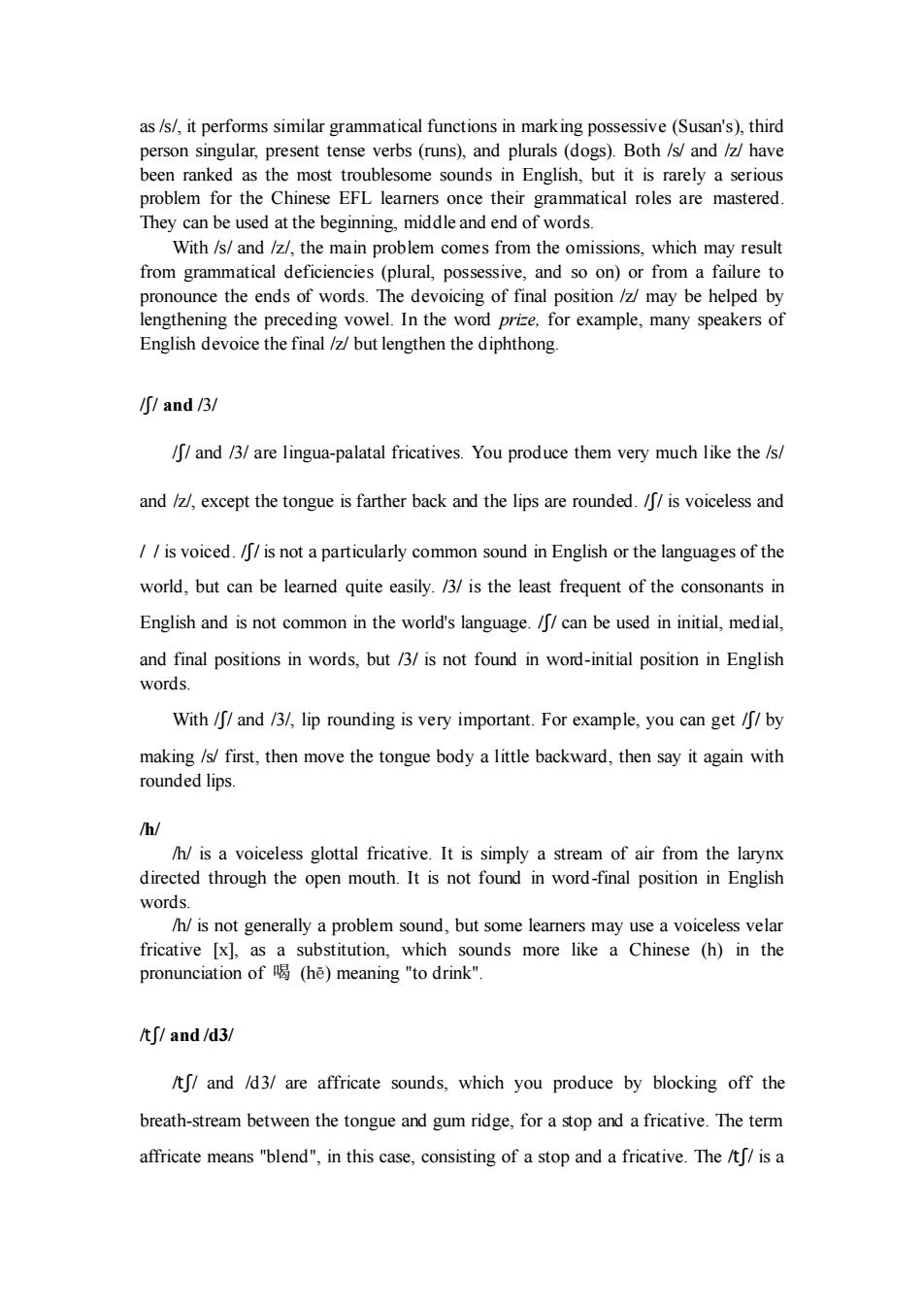正在加载图片...

ass/,it performs similar grammatical functions in marking possessive(Susan's).third )Both /s/and /z/have problem for the Chinese EFL leamers once their grammatical roles are mastered. They can be used at the beginning,middle and end of words. With /s/and /z/the main problem comes from the omissions.which may result from grammatical (ve,)or from failure o pronounce the ends of word The of final positionmay be helped by lengthening the preceding vowel.In the word prize,for example,many speakers of English devoice the final //but lengthen the diphthong. f/and B3/ /and B/are lingua-palatal fricatives.You produce them very much like the /s/ and/,except the tongue is farther back and the lips are rounded./f/is voiceless and /is voiced.is not a particularly common sound in English or the languages of the world,but can be leamed quite easily.3/is the least frequent of the consonants in English and is not common in the world's language./f/can be used in initial,medial, positions words,but 3/is not toud wt position in nl With/f/and 3/,lip rounding is very important.For example,you can get /by making /s/first,then move the tongue body a little backward,then say it again with rounded lips /h/is a voiceless glottal fricative.It is simply a stream of air from the larynx directed through the open mouth.It is not found in word-final position in English words. h/is not generally a problem sound,but some learners may use a voiceless velar as ch unds more like a Chinese (h)in the /and/d3/ tf/and /d3/are affricate sounds,which you produce by blocking off the breath-stream between the tongue and gum ridge,for a stop and a fricative.The term affricate means "blend",in this case,consisting of a stop and a fricative.The /tf/is a as /s/, it performs similar grammatical functions in marking possessive (Susan's), third person singular, present tense verbs (runs), and plurals (dogs). Both /s/ and /z/ have been ranked as the most troublesome sounds in English, but it is rarely a serious problem for the Chinese EFL learners once their grammatical roles are mastered. They can be used at the beginning, middle and end of words. With /s/ and /z/, the main problem comes from the omissions, which may result from grammatical deficiencies (plural, possessive, and so on) or from a failure to pronounce the ends of words. The devoicing of final position /z/ may be helped by lengthening the preceding vowel. In the word prize, for example, many speakers of English devoice the final /z/ but lengthen the diphthong. /ʃ/ and /3/ /ʃ/ and /3/ are lingua-palatal fricatives. You produce them very much like the /s/ and /z/, except the tongue is farther back and the lips are rounded. /ʃ/ is voiceless and / / is voiced. /ʃ/ is not a particularly common sound in English or the languages of the world, but can be learned quite easily. /3/ is the least frequent of the consonants in English and is not common in the world's language. /ʃ/ can be used in initial, medial, and final positions in words, but /3/ is not found in word-initial position in English words. With /ʃ/ and /3/, lip rounding is very important. For example, you can get /ʃ/ by making /s/ first, then move the tongue body a little backward, then say it again with rounded lips. /h/ /h/ is a voiceless glottal fricative. It is simply a stream of air from the larynx directed through the open mouth. It is not found in word-final position in English words. /h/ is not generally a problem sound, but some learners may use a voiceless velar fricative [x], as a substitution, which sounds more like a Chinese (h) in the pronunciation of 喝 (hē) meaning "to drink". /tʃ/ and /d3/ /tʃ/ and /d3/ are affricate sounds, which you produce by blocking off the breath-stream between the tongue and gum ridge, for a stop and a fricative. The term affricate means "blend", in this case, consisting of a stop and a fricative. The /tʃ/ is a